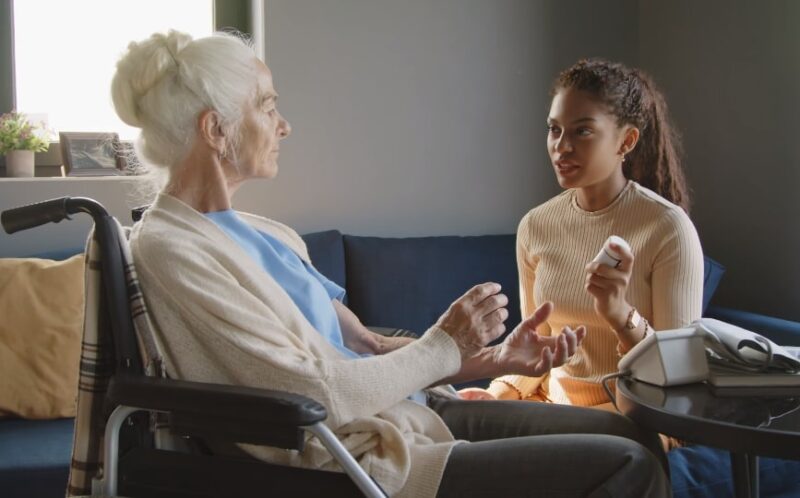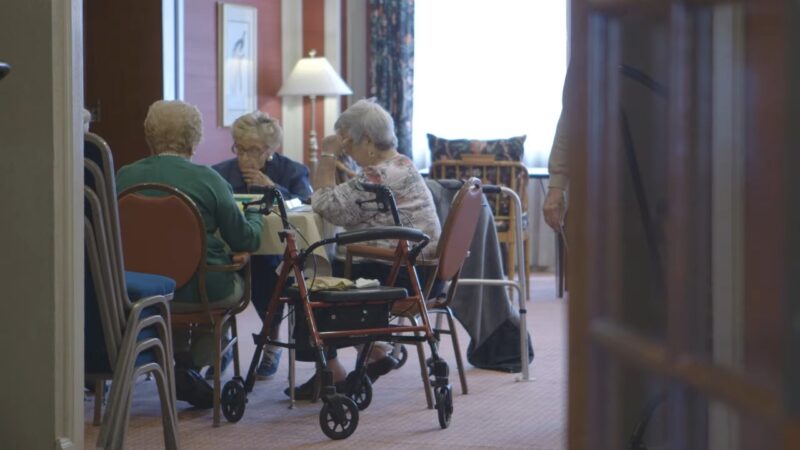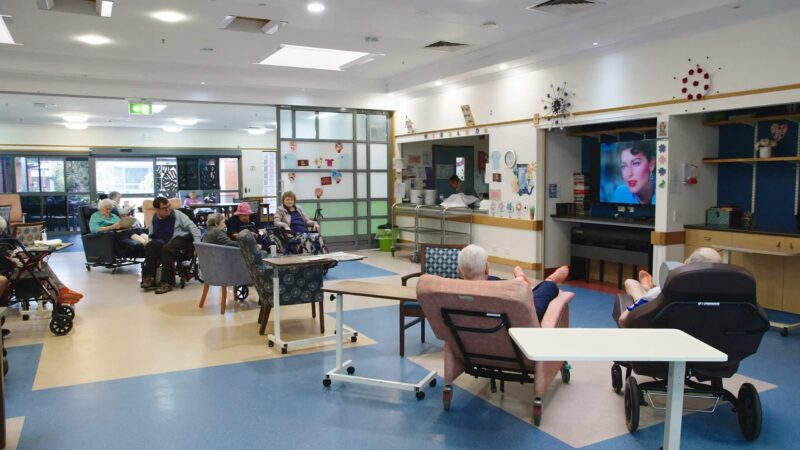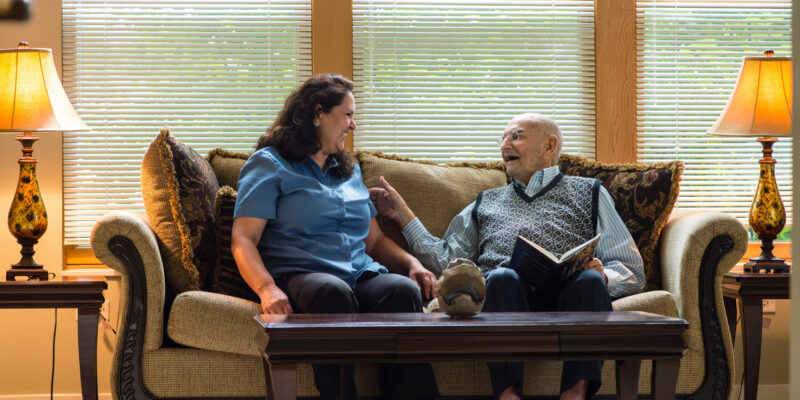When considering the transition from assisted living to a nursing home, it’s crucial to recognize the differences in care these facilities provide. Assisted living offers a blend of independence and support, ideal for those who require assistance with daily activities but still enjoy a level of autonomy. In contrast, nursing homes are designed for individuals requiring intensive, round-the-clock medical care and support.
This article will further explore the important factors that can determine the right time, but also about additional details to know, like how to choose the right facility, and what are the main benefits.
Key Takeaways
- The decision to transition from assisted living to a nursing home hinges on individual health and care needs, with key indicators including the need for 24-hour medical care, frequent hospital visits, and safety concerns.
- Choosing the right assisted living or nursing home facility involves evaluating the level of care required, researching and visiting potential facilities, checking for proper accreditation, understanding costs, and considering location and social opportunities.
Is There a Determined Timeline?
The decision to move from assisted living to a nursing home is a significant one, and there isn’t a one-size-fits-all timeline for making this transition. The right time varies depending on individual health, personal needs, and circumstances. However, there are several factors that families and seniors can consider to determine if the time is right.
Individual Needs

The most critical factor in deciding when to transition is the senior’s current and anticipated health and care needs. In assisted living, residents typically receive help with activities of daily living (ADLs), such as bathing, dressing, and medication management.
However, when a resident’s needs surpass what assisted living can provide, especially in terms of medical care and support, it may be time to consider a nursing home. Changes in physical health, such as increased frailty, frequent falls, or the progression of chronic illnesses like heart disease or diabetes, can be clear indicators.
Additionally, a noticeable decline in cognitive abilities, particularly in conditions like Alzheimer’s or other forms of dementia, might necessitate a higher level of care than what assisted living offers.
Frequent Hospital Visits
A key indicator is the frequency of hospital visits. If a senior is frequently hospitalized for various health issues, this could be a sign that the level of care in assisted living is no longer adequate. Nursing homes offer more comprehensive medical care and supervision, which could help in managing complex health conditions more effectively.
Safety Concerns

Safety is a crucial concern. If a senior is no longer safe in an assisted living setting due to mobility issues, falls, or cognitive impairments that lead to wandering or other risky behaviors, a nursing home with a more secure and supervised environment might be necessary.
Specialist Recommendations
Healthcare professionals can provide valuable insights into when a transition might be necessary. Regular assessments by medical professionals, including primary care physicians, geriatricians, and neurologists, can help in making an informed decision.
What Are the Main Reasons to Consider Assisted Living?
Assisted living facilities offer a unique blend of independence and support, making them an ideal choice for seniors who require some assistance but still wish to maintain a level of autonomy. These facilities provide a middle ground between living independently at home and the intensive care offered in nursing homes.
Required Assistance

One of the primary reasons to consider assisted living is the need for help with daily living activities (ADLs). These include bathing, dressing, eating, and mobility. Assisted living facilities have trained staff available to assist with these tasks, ensuring that residents can maintain their daily routines with dignity and ease.
Access to Medical Care
While not providing intensive medical care like nursing homes, assisted living facilities do offer access to medical care and assistance with medication management. This is particularly beneficial for seniors who have chronic conditions that require regular monitoring and those who take multiple medications and need help managing them.
Nutritional Needs
Many seniors find meal preparation challenging, especially if living alone. Assisted living facilities provide nutritious meals, catering to specific dietary needs and preferences. This not only ensures that residents receive a balanced diet but also adds a social component to meal times, which is important for mental health.
Socialization and Activities

Social isolation can be a significant issue for seniors. Assisted living communities offer a variety of social activities, clubs, and events, encouraging residents to engage with peers and form meaningful relationships. This active social life is vital for mental well-being and can help in preventing feelings of loneliness and depression.
Safety and Security
Safety concerns, particularly for seniors with mobility issues or those who are at risk of falls, are a significant reason to consider assisted living. These facilities are designed with the safety of seniors in mind, equipped with features like grab bars, emergency call systems, and staff available 24/7 to assist in emergencies.
Housekeeping and Maintenance
Assisted living facilities take care of housekeeping and maintenance, relieving residents of the burden of chores like cleaning, laundry, and yard work. This allows seniors to focus on enjoying their retirement without the stress of home maintenance.
Transportation Services

For seniors who no longer drive, transportation can be a significant concern. Assisted living facilities often provide transportation services for shopping, medical appointments, and other activities, ensuring residents can remain active and engaged without transportation issues.
Customizable Levels of Care
Assisted living facilities offer customizable levels of care, which means that the services provided can be adjusted as a resident’s needs change. This flexibility ensures that residents receive the right amount of support while maintaining as much independence as possible.
Peace of Mind for Families
For families, knowing that their loved one is in a safe environment, receiving the necessary care and support, provides peace of mind. It assures them that their family member is not only well cared for but also enjoying a quality of life that might be challenging to maintain at home.
How to Choose the Right Facility?
Selecting the right assisted living or nursing home facility is a critical decision, involving several factors to ensure the best fit for the individual’s needs and preferences.
The Level of Care Needed

The first step is to evaluate the level of care required. For assisted living, consider how much help is needed with daily activities like bathing, dressing, and medication management. For nursing homes, assess the need for 24-hour medical care and support. Consulting with healthcare professionals can provide clarity on the appropriate level of care.
Research Facilities
Begin by researching facilities in the desired area. Look for places with good reputations, and check for any history of violations or complaints. Resources like state health department websites and senior care directories can be valuable. Also, ask for recommendations from friends, family, or healthcare providers.
Visiting the facilities is crucial. Schedule tours to get a feel for the environment, the staff, and the residents. Observe how staff interact with residents, the cleanliness and safety of the facility, and the overall atmosphere. A visit can also reveal the quality of meals, activities offered, and the layout of the living spaces.
Check for Accreditation and Licensing
Ensure that the facility is properly licensed and accredited by relevant state and national organizations. This confirms that the facility meets certain standards of care and operation.
The quality of staff is vital. Inquire about the staff-to-resident ratio, their qualifications, and how they are trained to handle emergencies. It’s also important to understand how medical care is provided and if there are nurses or doctors on-site or on call.
The Price Can Also be an Important Factor
Understand the monthly fees, additional costs for extra services, and how increases in fees are handled. Also, review the contract carefully to understand the terms and conditions.
Location

The location is important for family visits and access to local amenities. A convenient location can make it easier for family and friends to visit and for the resident to access off-site activities or medical appointments.
Read Reviews and Talk to Residents
Read online reviews and talk to current residents and their families for first-hand insights. They can provide valuable information about living in the facility that might not be apparent during a tour.
FAQs
How often should I visit elderly parents?
There is no definitive answer to this question, as it depends on many factors, such as your parents’ health, preferences, and living situation, as well as your own availability, distance, and relationship. However, some general guidelines are to visit them at least once a week, if possible, and to call them regularly to check on their well-being and show your care.
Why do dementia patients need 24-hour care?
Dementia patients need 24-hour care because they may experience cognitive decline, memory loss, confusion, disorientation, and behavioral changes that make it difficult for them to perform daily activities, such as eating, dressing, bathing, and taking medications.
They may also wander, get lost, or put themselves in danger without supervision. Therefore, they need constant assistance and monitoring to ensure their safety and comfort.
Can people be happy in a nursing home?
People can be happy in a nursing home if they receive quality care, respect, and dignity from the staff, and if they have opportunities to socialize, engage in meaningful activities, and maintain their autonomy and identity.
However, happiness is subjective and influenced by many factors, such as the person’s personality, expectations, adaptation, and satisfaction with the nursing home environment and services.
Do people live longer in nursing homes?
There is no conclusive evidence that people live longer in nursing homes than in other settings, such as their own homes, assisted living facilities, or hospice care. However, some studies suggest that nursing home residents may have lower mortality rates than those who live alone or with family, due to the availability of medical care, nutrition, and social support. The life expectancy of nursing home residents may also vary depending on their age, gender, health condition, and quality of life.
Last Words
Assisted living provides a balance of independence and support, suitable for those who need help with daily activities but still cherish their autonomy. Nursing homes, on the other hand, offer extensive medical care and round-the-clock support for those with more demanding health needs.
Choosing the right facility, whether it’s an assisted living community or a nursing home, requires thorough research, careful consideration of care needs, and an understanding of the financial implications.
